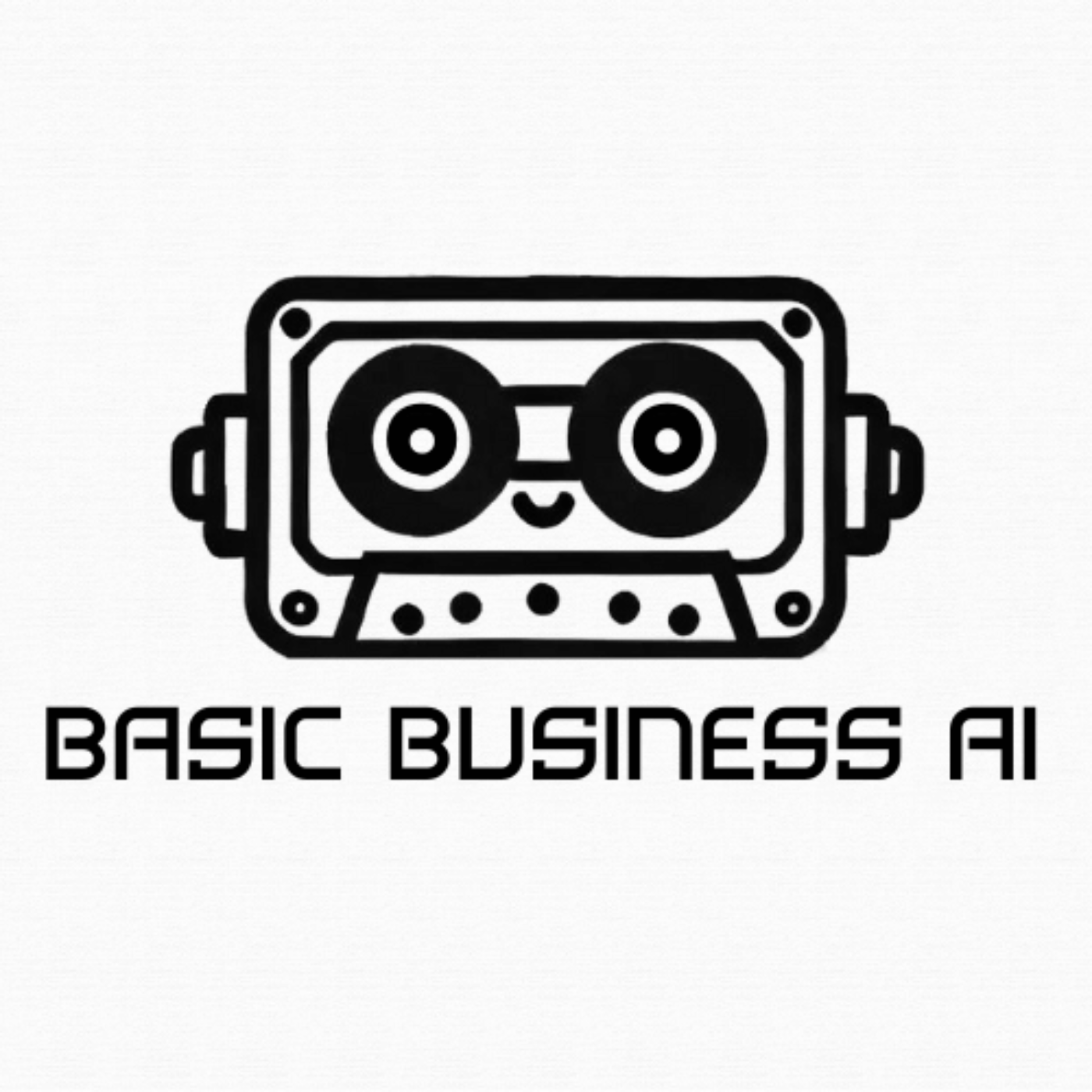Episode Transcript
[00:00:00] Speaker A: Welcome to basic Business AI. If I can learn how to talk, a podcast dedicated to simple AI strategies for businesses who don't want to get an advanced tech degree or hire some marketing bro. I'm your host, Josh Thomas. You can find me on all social media at JT. Literally. We bring on regular business owners like you, like me, to discuss practical strategies, ideas, and perspectives about AI without getting too far into the weeds of tech. BB AI is sponsored by Anabots. We build AI with heart. Our trained AI sales and support assistants work twenty four seven to increase sales, reduce costs, and free up your time so you can focus on growing your business. If you want to install a 24/7 near human sales and support team in your business, go to Anabots AI to learn more. We do have low cost options to fit any budget. Once more, that's Anabots AI. Today's guest, Mister Chris Daley. Futurist, consultant, speaker, AI and automation strategist. 19 year podcasting expert, Chief AI Officer, author, speaker, game designer, Texas high school football historian. He is the ultimate amalgamation of the pure texan mister Chris Daly, a man that I admire because he has recorded, what, 5000 podcasts at this point in your life?
[00:01:22] Speaker B: It's over 10,000 now.
[00:01:24] Speaker A: 10,000 podcasts. You know, I like to brag when I go out and tell people, I had another podcast I ran called how to lose money. We did 238 episodes. I got another one called the Do Zone that's coming up on 250 here at the end of the year. We just started a third podcast called Basic Business AI, and we've cranked out, like 30 episodes of that. I'm like, yeah, man, I got it going on.
And then I remember my friend Chris.
[00:01:53] Speaker B: Well, that doesn't mean anything.
You know, the bio said 19 years. It's actually 20 this month. So, you know, you divide that amongst 20 years, that's a lot of time to put out, a lot.
[00:02:06] Speaker A: Indeed it is. And I want you to tell the story real quick. Now, this is an AI podcast, and I promise we'll get into AI in a minute. But, of course, I remember very vividly, it is you were either the fourth or fifth person to ever do a podcast, depending on who you talk to, right?
[00:02:23] Speaker B: Right. I think it's fifth or 6th. Okay. Thank you for buffing it up.
Yeah.
[00:02:29] Speaker A: So. So tell us, just really quick, tell us that story. You're like the fifth or 6th person to ever do a podcast.
[00:02:36] Speaker B: Well, I just. I happen to know some of the guys who invented it and knew them online. So, you know, we're we were communicating back in the Internet radio days before podcasting became a thing. And so just saw what they were doing. We exchanged it, exchanged tons of emails and message board content, and I thought, hey, I'm going to try this thing out with my big passion, Texas high school football. So I launched Lone Star Gridiron, and, you know, that one's still going. And now, actually, that site puts out about 30 episodes a week during the football seasons.
[00:03:21] Speaker A: Yeah, that's intense, man.
[00:03:23] Speaker B: Yes.
[00:03:24] Speaker A: That is awesome. And so a question that I ask every single guest as they come on here is, I want to know, from your perspective, how is AI reshaping the future of your industry? And it can be Texas high school football. If you want to talk about that, it can be podcasting.
You go in a lot of different directions. Where do you feel like AI is really reshaping the most?
[00:03:50] Speaker B: Everywhere. And I know that's kind of a lame answer, but it is. I find that if you're in an information field, if you're doing anything with information, I think the study I saw said that AI can help reduce your work by about 30%, which makes you more productive. Now, if you're a small business, that doesn't mean, you know, you can fire a whole bunch of people, because everybody's chief cook and bottle washer, right? So they're doing all kinds of things. But if you're at a big business, that's when the big layoffs are coming, is because you have 300 people doing the same thing, 100 of them need to find new gigs.
But I'm seeing it in podcasting. I seeing it with the transcription of show notes and things like that. I even. I do a podcast for a professor at the University of Texas.
He doesn't like talking all day because he speaks all day in class. He speaks on the weekends as a pastor. He is a public speaker that goes around the country speaking, and he's like, I'm tired of talking. So we trained AI on his voice, and he just sends me a script, and his wife will swear it's him. It's that good. It's so good. And so it's every industry. It's changing everything drastically.
[00:05:16] Speaker A: And what's really happening is you have no precedent for the speed of the development. And I'll give you an example. We started an AI company. We're building AI powered assistance to automate sales and customer support issues. We feel like we do a much better job than most people because we've been running businesses and building sales teams for 15 years, and we're not just some, like 16 year old that doesn't know anything.
But we took a stance against AI voice because at the time, when we started our company just a few months ago, the quality of an AI voice call was inferior. It was not pleasant. And we revisited this past month and we're like, oh, crap.
Yes, we better start offering this now because it's so much better than it was just a couple of months ago.
[00:06:17] Speaker B: Yeah. There was some study I saw. It was from a book, architects of intelligence, I think it was called. And it said, from the time AI was first created until it was kindergarten level, intelligence took about 30 years. To go to above college level took another six months. So it's that fast. It is changing. And you see it every week. You see new development. You see things like Suno who write entire songs. It's crazy.
[00:06:52] Speaker A: Yeah, indeed. And it just reminded me, I had a guy tell me about, and I just learned, like five minutes ago, there's this thing in video that you just tell it to write, make a video, and it will, like, rewrite a whole video for you. And if.
[00:07:08] Speaker B: Yeah, I use it all the time.
[00:07:10] Speaker A: Yeah.
I was today years old when I found out about that.
Yeah. And so that's.
It's the, the other thing that's worth mentioning, Chris, and I'd love to get your take on this is, how do you tell between all of this stuff is out there, what's good and what's not? And this is something I'm actually going to be speaking on this, and I'd love to get your take because there's guys like you and me that we were not living our lives for AI forever. We were growing businesses, and now we're in AI and we're applying those principles and we're trying to run a good business. But then there's other guys out there that put up a shiny website and say some cool words, and they get a lot of customers and they got garbage product. How do you tell the difference?
[00:07:58] Speaker B: It's difficult. I like the approach of this podcast. Cause this podcast is just like, I'm spending a lot of my time now speaking to business groups about AI and how to, you know, at the bottom level, figure out if it makes sense for them. And it comes down to the same thing. It comes down to with everything else out there. There are the shiny people and there are the people who you just get the gut feel they're real. So, you know, that's what you're doing here. You're having a real conversation with people about real things, you're not saying, you know, blowing smoke and talking about, yeah, this will change XYZ. And even though, you know, you say you're relatively new to the field, you know, guys like me, I was playing with AI in the eighties when it was horrible.
Nothing happened until recently. So I don't care who you are, if you started a month ago, you know, the good stuff, you didn't need to know the stuff in the eighties.
[00:09:01] Speaker A: Yeah, right. Right. And so I'm curious. Let's. Let's go back there. Let's take advantage of the fact that you were using AI in the eighties. Don't know a lot of people like that. Now. We did some research. We were doing a presentation in San Antonio not too long ago, and our research revealed the first time that the term artificial intelligence was used was actually in 19, 55, 80 years ago, something like that. 70. 80 years ago? I can't account. Yeah, 70 years ago. And at the time, obviously, that meant something different than it means now. But talk. Tell us a little bit about what was AI in the eighties. Like, what was happening there?
[00:09:44] Speaker B: Well, in the eighties, remember, this is predated the Internet by a boatload. But the ARPANET was there, which was the, you know, the defense department had set up this internetwork between universities and government offices. And so that's where I ran into it. I was at college on a mainframe. Green screen or black screen with the green text, and you're just typing. And I was interacting with a program called Eliza. And it was like I said, the first real AI. And it was actually promoted as an AI, but it was more. It was more like a counselor than anything. So you just type things and it would type it back. And it was so stupid.
I mean, it was ridiculously dumb, but it was cool because it could remember something for a few minutes.
[00:10:39] Speaker A: Give us an example of a conversation you were having with Eliza back in the eighties.
[00:10:44] Speaker B: Gosh, it was, it was just she had no knowledge of the world or anything other than, you know, I would say, hey, how's it going? And she would say something like, it's pretty good. How are things with you? And then when you'd say something like, oh, class today was horrible, and I've got this thing tonight. Oh, tell me about class today. So it could literally, it had a memory of a goldfish. So two sentences later, it had no clue. You had a class today?
[00:11:15] Speaker A: Like, oh, yeah. Hello. Hi, I'm dory.
That's funny, man.
[00:11:20] Speaker B: Yeah, it got boring really fast.
[00:11:24] Speaker A: Yeah, yeah, yeah. So and one thing that I know is really important to you is you. You've always been on the cutting edge of technology, and, you know, you and I go back. We don't hang out a lot, but we go back 1015 years, and you've always been that guy that's, like, a little bit ahead of everybody else in the room. And so if there's somebody here right now, the way I like to describe our audience is, let's say there's 100 people in a room, and there's a guy on the stage talking. And the guy on the stage talking is AI.
There's 20 people that are, like, crowding the front of the stage. Those are the people that are using AI. And then there's, like, those weird, like, five or ten wackos that are, like, trying to climb up on the stage and, like, touch the robe. Those are your fanatics.
[00:12:15] Speaker B: And.
[00:12:16] Speaker A: And then there's everybody else who's kind of, like, in the back. You know, there's a couple of ladies, like, that are just going to the bathroom. There's a guy at the water cooler. There's four or five people at the bar. They're, like, curious about what's going on a stage, but they don't want to get too close because they don't want to. They don't want to feel stupid. That's. That's our guys.
[00:12:36] Speaker B: Yeah.
[00:12:37] Speaker A: Those are the people that we really want to serve because that's the majority. And I honestly. It's coming.
[00:12:43] Speaker B: Yeah.
[00:12:44] Speaker A: You can't hide in the back of the room too much longer. And so we want to empower those people to say, hey, this is not so intimidating. It's not so scary.
What are some tools that you and your perspective can arm these guys with so that they can actually embrace AI and get ahead of the curve instead of being behind at this time?
[00:13:04] Speaker B: Yeah, I think two things. One, get on. Chat. GPT, get on Clyde, get on any one of those. Pick one, it doesn't matter, and play with it. You cannot break it. So learn how it interacts.
And that alone will do more than any amount of going to seminars.
But two, you mentioned bots.
There are some amazing bots out there. And, in fact, I've helped a couple nonprofits install some bots that are specifically written or created for writing grants. And they actually go out, they research the grants, tell you which grants apply to you, and then they will learn from your previous grants who you are and what you do, and they'll write the darn grant for you.
And instead of giving a grant writer 20% to 25% to the grant award, it's saving them tens of thousands of dollars often and weeks and weeks of work. So you get with somebody like myself, reach out to me, we have a free strategy call. I'll talk about at the end, and we'll figure out where that low hanging fruit is and figure out what it is you need to get a early case, win out of AI, and just kind of feel it.
[00:14:31] Speaker A: And that's really the key, is if you can do one thing and get one outcome, one result, a lot of times that's the charge we need to go in and do the next thing. And one thing, Chris, I think that you're saying is you don't necessarily have to become an AI expert. No, that's not essential. There are people that are good at that, like me personally, I suck at math, my taxes are always a mess, and I will never be good at that, but I have to do it, and so I hire an accountant.
You may not ever be good at AI, and you may never want to be good at AI, but that's fine because there's plenty of other people that have invested their time and energy like Chris. So, Chris, tell us a little bit more about what it is that you specifically do and how people can connect with you.
[00:15:25] Speaker B: Like I said, I've got a free strategy call. You can go to freshmediaworks.com AI, sign up for a free strategy call. It's just a Zoom call, and we dig in and figure out what your business is and figure out what makes sense, what doesn't. You can hire us as a fractional Caio, which is chief artificial intelligence officer, which is the fastest growing C suite title in the world right now.
So, but rather than hiring one or becoming one yourself, you can just hire us fractionally and we'll help, you know, figure out what you need and implement it. But we also have some great tools we can share as far as if you wanted to become trained and become, you know, increase your, your resume or improve it, if you want to become a Caio, we can point you to some trainings, some really good ones out there.
[00:16:21] Speaker A: Awesome. Hey, we're going to wrap from here. Thanks to our guest, Chris Daley, for joining us for practical conversation about AI and its potential for business, and also for the trip down memory lane to Eliza in the eighties. Hey, you can learn more about what Chris does by visiting his website, freshmediaworks.com dot. If you run a business of any size and you have some ideas or strategies around the topic of AI. We'd love to have you on a future episode as well. We do interview business owners of all levels of experience and exposure to AI, so we can represent all voices, especially those 80% to 90% of us in the back of the room who are kind of curious about it, but not trying to be tech geniuses. So you can apply for a future episode by going to basicbusinessai.com. and one more time, if you have if you want to install a sales and support team that actually has a heart for less than 10% of the cost of a single employee, get yourself an anabot. You can learn more by going to anabots AI. We'll see you next time here on Basic Business AI. And by the way, if you like this episode, tell your friends. See you later.



